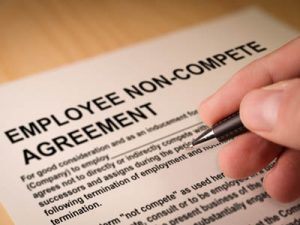Legal Blog
FTC’s Final Rule: Understanding the Ban on Non-Compete Clauses

On April 23, 2024, the United States Federal Trade Commission (FTC) announced its final rule on non-competition clauses, voting 3-2 to adopt the final regulations, known as the “Non-Compete Clause Rule.” This rule marks a significant milestone, establishing a comprehensive ban on non-compete agreements. The decision comes fifteen months after the FTC released its proposed rule in January 2023. The final rule will not take effect until 120 days after publication in the Federal Register, and lawsuits have already been brought challenging the authority of the FTC to issue such a broad rule. Nonetheless, it is crucial for employers to understand the broad requirements, the exceptions, and how to protect legitimate business interests in the wake of the FTC’s rule.
The rule applies to all businesses and individuals within the FTC’s jurisdiction, which covers all types of companies in nearly all industries. However, certain entities fall outside the FTC’s jurisdiction and, therefore, are exempt from the ban. These include banks, savings and loan institutions, federal credit unions, common carriers, air carriers, and certain non-profits.
The rule restricts businesses and individuals from including non-competition language in future employment agreements, policies, handbooks, or websites for their workers. Additionally, it extends to non-solicitation and confidentiality agreements that function as de facto non-competition agreements. Importantly, this prohibition applies to all workers (not just “employees”), including independent contractors, interns, externs, volunteers, apprentices, and others. According to the rule’s preamble, “it is an unfair method of competition—and therefore a violation of section 5—for employers to, inter alia, enter into non-compete clauses with workers on or after the final rule’s effective date.”
Once the rule takes effect, agreements and policies containing non-compete language will become unenforceable, with the only exception being for “Senior Executives.” The rule defines “Senior Executives” as a worker earning more than $151,164 annually and holding a “policy-making position.” Compensation can include salary, commissions, performance bonuses, and any other agreed-upon forms of compensation, excluding benefits or board and lodging. If the individual only worked part of the year, their earned compensation can be annualized to determine whether they meet the threshold. Policy-making positions include the president, CEO, or individuals with authority to make company-wide policy decisions. While “Senior Executives” will not have their non-competes retroactively voided like other workers, the rule prohibits covered businesses and individuals from entering into such agreements with future workers, even if they qualify as “Senior Executives.”
Once in effect, the rule will also require businesses and individuals to notify workers of the ban and rescind existing non-competes (except those with senior executives). Model language for an appropriate notice can be accessed at Noncompete Rule | Federal Trade Commission (ftc.gov). Consequently, the bulk of existing restrictions will become unenforceable upon the rule’s enactment. The FTC anticipates the rule will increase employee earnings by at least $400 billion over the next decade.
While the rule fundamentally prohibits all non-compete agreements between businesses and their workers, exceptions exist for non-competes between businesses and between the seller and buyer of a company. Specifically, the FTC’s rule prohibits anything that restricts, penalizes, or prevents a worker from pursuing a different job or starting a business after leaving their current job. That includes:
- Prohibitive terms and conditions expressly saying that a worker cannot get another job, such as with a competitor or embark on a business venture;
- Terms and conditions mandating financial penalties for workers who get another job or start a business; or
- Terms and conditions that aren’t labeled as non-competes but are so restrictive that they effectively prevent a worker from getting a new job or starting a business. This may include overly broad confidentiality clauses, which could potentially violate the National Labor Relations Act, Employers are advised to seek guidance from experienced employment counsel to ensure compliance.
As noted at the outset, given the extremely broad nature of the rule, legal challenges are anticipated, potentially leading to further delays or permanently preventing the rule’s enactment. We will continue monitoring developments and providing updates accordingly. In the meantime, employers are encouraged to take advantage of this period by:
- Evaluating and analyzing existing agreements to ensure certain protections are in place in anticipation of the rule’s implementation; and
- Consulting with trusted legal counsel to devise a communication strategy regarding the notice requirement for impacted workers, ensuring effectiveness and compliance with legal standards.
If you have any questions or need assistance with navigating these changes, please reach out to Gabriel Celii and Sarah Goodman
ABOUT SARAH GOODMAN
 sarah.goodman@offitkurman.com | 267.338.1319
sarah.goodman@offitkurman.com | 267.338.1319
Sarah R. Goodman is a member of Offit Kurman’s Labor & Employment practice group. Sarah’s practice focuses on federal and state labor and employment investigations, counseling, and litigation. She routinely advises public and private employers on workplace matters and employment disputes involving Title VII, ADEA, ADA, state/city statutes pertaining to employment regulations, and policy development. Sarah’s work includes litigating wage and hour, discrimination, sexual harassment, retaliation, and breach of contract claims in federal and state court, and before administrative agencies, including the Equal Employment Opportunity Commission.
ABOUT GABRIEL CELII
 gcelii@offitkurman.com | 267.338.1361
gcelii@offitkurman.com | 267.338.1361
Mr. Celii devotes his practice to representing businesses and municipal entities navigating labor and employment disputes ranging from wage and hour litigation and work place discrimination defense to labor negotiations and the resolution of grievances. During his representation of Philadelphia-area Townships and Counties, he has successfully defended claims brought against public officials and advised municipalities on the drafting of local ordinances, such as Police Pension DROP amendments.
